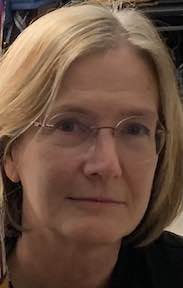NEWS
Dr. Mary Lou Maher Announced as the 2023 NCWIT Harrold and Notkin Award Recipient
Follow me on Medium!
Mary Lou Maher's New Website for more project news
This project builds on models of computational creativity to develop a curiosity-driven cognitive systems approach to personalize a learning trajectory
to increase curiosity and the learners’ intrinsic motivation and knowledge retention. This project is funded by NSF Award (#1618810).
This is a series of projects that focus on interaction models for humans to be inspired by various deep learning models. The projects focus on different interaction modalities,
the evaluation of user experience and impact on cognition, and the ethical concerns in generative AI.
What if the goal of Artificial General Intelligence (AGI) is to enhance human creativity?
This is a collaborative project between UNC Charlotte and Temple University to study relationships between student success and the course climate and teaching practices of their computer science courses. These relationships will consider students’ intersecting identities, such as women who are first-generation college students. The project has developed CALI: a Collaborative Active Learning and Inclusivity inventory for characterizing features of course climate that may affect student success. The project is funded by the NSF IUSE Program (#2111376).
CURRENT POSITIONS
Professor in the Department of Software and Information Systems, College of Computing and Informatics, UNC Charlotte: The Department of Software and Information Systems (SIS) is best known for its teaching and research in intelligent systems, human centered design, and cyber security. The Department has 20 faculty, 55 PhD students, 200 MS students, and 330 undergraduate students. SIS contributes significantly to regional and international efforts in Cybersecurity, Data Science, and CS Education research.
Director of the Center for Education Innovation, College of Computing and Informatics, UNC Charlotte: The Center for Education Innovation (CEI) was established in 2013 to focus and encourage innovation in CS education. The CEI has over 20 externally funded projects in flipped classroom education, lightweight teams, innovative digital technologies for education, and service learning. The CEI places an emphasis on CS education methods that develop T-shaped computing professionals and researchers.
Co-Director in the Human Centered Computing Lab, Department of Software and Information Systems, College of Computing and Informatics, UNC Charlotte: The HCC Lab at UNC Charlotte focuses on creativity, ubiquitous computing, novel interaction technologies, recommender systems, interaction with big data, and usable security. The HCC Lab has 5 faculty, 4-6 undergraduate researchers, 1-3 MS researchers, 12-15 PhD students, and a Research Professor.
PREVIOUS POSITIONS
Chair, Department of Software and Information Systems, College of Computing and Informatics, University of North Carolina Charlotte: 2012-2020. The Software and Information Systems Department is a pioneer in Information Technology research and education emphasizing designing and deploying integrated, secure, reliable, and human-centered IT solutions. While I was Department Chair, faculty participation in writing proposals for external funding was 100%.
Senior Research Scientist, College of Information Studies, University of Maryland, 2010-2012: Senior Research Scientist at the University of Maryland doing research in the Human-Computer Interaction Lab. This is a multidisciplinary group of faculty from Computer Science, Information Studies, Engineering, and Humanities disciplines.
Program Director, Computer and Information Science & Engineering, National Science Foundation, 2006-2010: I mentored faculty in universities throughout the US to prepare for a program I established called CreativeIT by organizing workshops, funding exploratory research and developing a solicitation for funding in 2008-2010. I was part of the Human-Centered Computing cluster focussing on research in HCI techniques, social computing, computer-supported collaborative work, virtual worlds, and multi-agent systems. I was co-chair of the Cyber-Enabled Discovery and Innovation Program in 2009, participated in the development of the Social Computational Systems solicitation, participated in the Science of Design program and its evolution into the Rethinking Software program area, assisted in the development of the Virtual Organizations as Socio-technical Systems solicitation, served as a technical coordinator for the Spatial Information Science of Learning Center, and participated in the development of an action plan for Broadening Participation in CISE. As a member of the Senior Executive Service in 2009, I was the Deputy Director of the Division of Information and Intelligent Systems and served on the SWAT Team for improving the hiring processes in the Federal Government to make the government an employer of choice.
Professor of Design Computing,, jointly in Architecture and Computer Science, University of Sydney, 1990-2006, currently Honorary Professor: promoted to a personal chair as Professor of Design Computing in 1997. Highlights are: Developed a new interdisciplinary undergraduate degree Bachelor of Design Computing and served as Program Coordinator for 5 years; Program Coordinator for Graduate Program in Design Computing for 10 years; Chair of the Department of Architectural and Design Science for 2 years while the School was restructuring, Joint appointment with the School of Information Technologies for 3 years; Research provider for Collaborative Research Centre for Construction Innovation and for National ICT Australia, Co-Director of the Key Centre of Design Computing for 15 years.
Visting Professor in Design and Computation, Massachusetts Institute of Technology, 2002: teaching and research in the Design and Computation Group in the School of Architecture on designing virtual worlds; collaborating with Active Worlds Inc. to develop agent models using their platform.
Adjunct Professor in Social Policy, Columbia University, 2002: teaching in the School of International and Public Affairs on computer-mediated communication in virtual worlds.
Associate Professor in Civil Engineering, Carnegie Mellon University, 1984-1989: teaching and research in computer-aided engineering in Civil Engineering.

